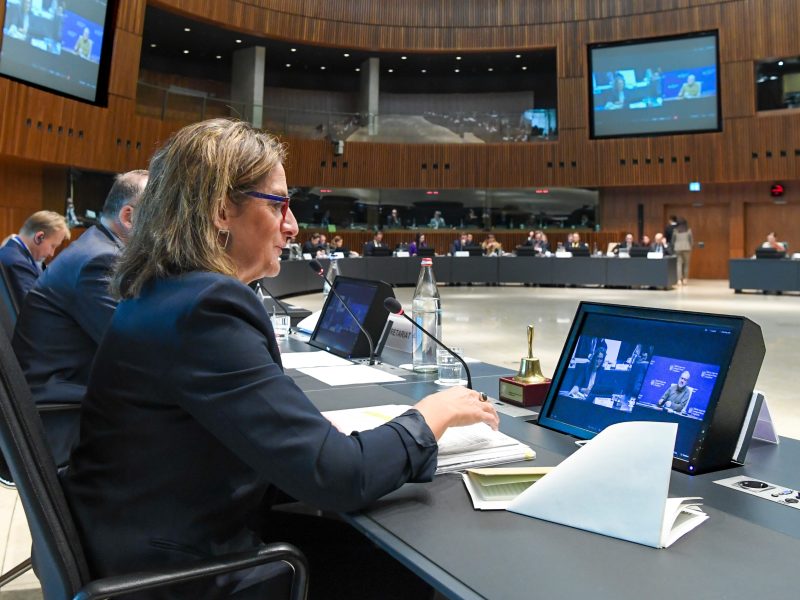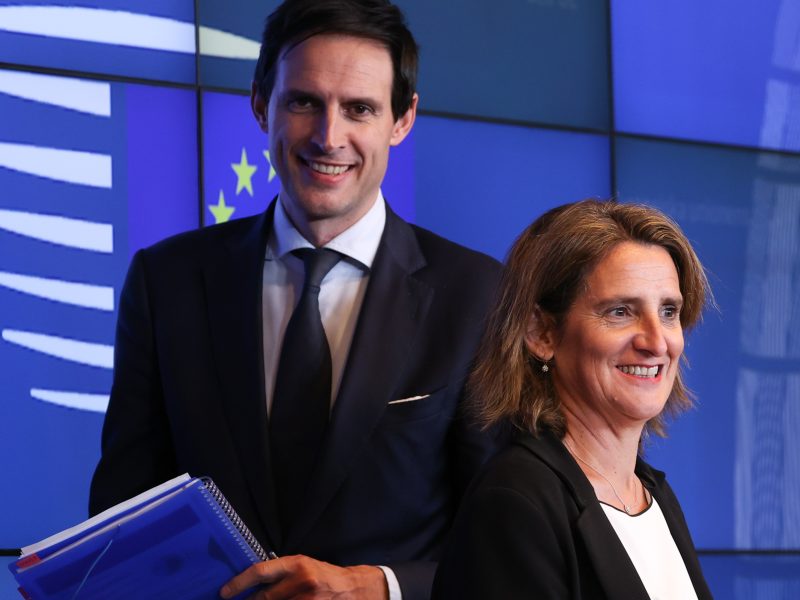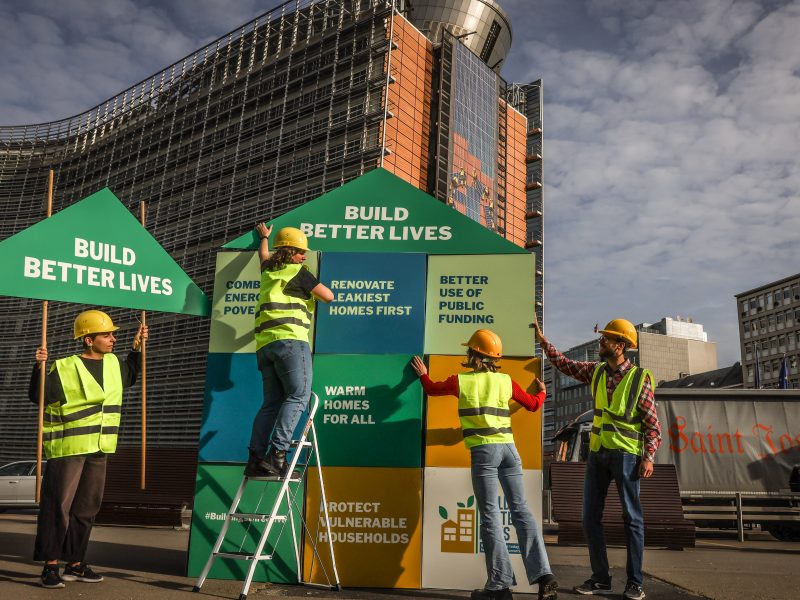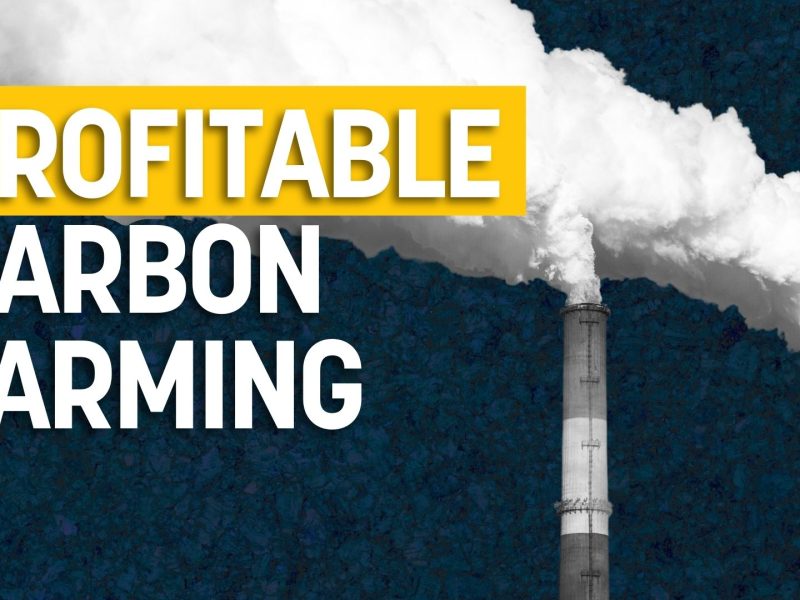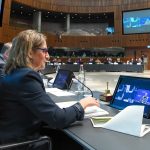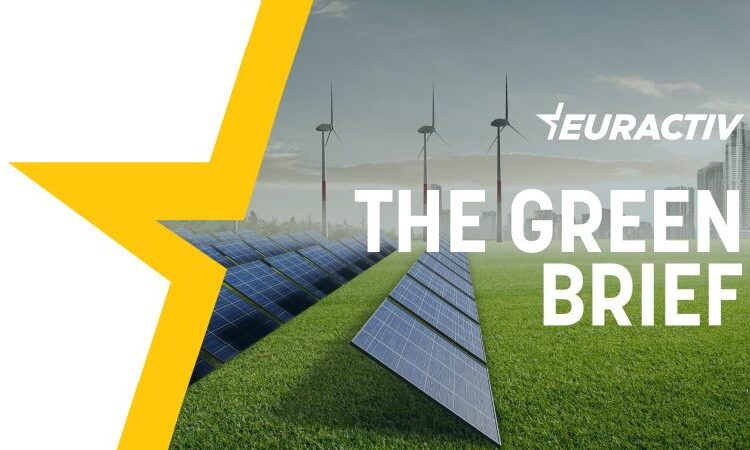
Hello and a big welcome to our new subscribers from Svenska kraftnät, ArcelorMittal, WWF and more. Euractiv’s Green Brief brings you a roundup of energy and environment news from across Europe. You can subscribe here.
“Never waste a good crisis”. The famous expression attributed to Winston Churchill probably best encapsulates America’s opportunistic response to the energy crisis that has gripped Europe for the past two years.
The figures speak for themselves. The US became the world’s largest exporter of liquefied natural gas (LNG) last year, largely filling the vacuum left by Russia, whose gas exports to Europe plunged following economic sanctions imposed on Moscow for its war in Ukraine.
At the same time, Europe also became the primary destination for US exports of LNG, accounting for 64% of the total in 2022, according to the US Energy Information Administration, up from 23% the year before.
Now, America is looking to repeat this success story in the area of nuclear energy by pushing for the delivery of US-made small modular reactors – or SMRs – to Eastern Europe.
No SMRs are in operation yet across the globe but the technology is considered promising and was featured in the European Commission’s Net-Zero Industry Act tabled in March this year. Their main advantage is that they can be factory-assembled and delivered anywhere in the world, including to remote areas with limited grid coverage.
Several companies have developed SMR concepts, including France’s Nuward, a subsidiary of state utility EDF, and US-based NuScale.
But the US is faster and more resolute than the European Union when it comes to marketing SMRs to potential buyers in Eastern Europe.
During a summit in Bucharest last month, US Assistant Secretary of State Geoffrey Pyatt waxed lyrical about his country’s “civil nuclear alliance with Romania”, highlighting plans to build a small modular reactor there by 2029.
Similarly, the US is in talks with Czechia to deploy a US-made SMR there “in the late 2020s”, Pyatt said, earlier than the 2032 date initially foreseen by Prague.
The Czech and Romanian SMR projects are part of a broader US plan, called “Project Phoenix”, which aims to replace polluting coal-fired power plants in central and eastern Europe with US-built SMRs. Slovakia and Poland were also selected to take part in Project Phoenix, the US announced on 7 September.
Project Phoenix was first announced at the United Nation’s COP27 climate summit last year by John Kerry, the US special envoy for climate change.
But Pyatt acknowledged that Project Phoenix goes beyond climate change concerns, saying the US sees energy security issues as “a core element of our transatlantic security”.
“We want to support our allies and partners,” he said in a briefing with journalists last month. And that “starts in the trans-Atlantic context where we have such a thick web of alliances, including through NATO”, Pyatt explained.
Russia’s war in Ukraine indeed brought about a harsh realisation for many governments in Europe that energy questions have a security dimension going beyond the traditional spheres of market economics or environmental policy.
Pyatt himself was open about this, saying the strategic objective of the US in Eastern Europe was to defeat Russia’s “effort to weaponise energy through the use of coercion against our allies in Europe”.
“We have competitors and adversaries around the world. They want to dominate supply chains, they want to push through and question sovereign borders, they want to coerce their neighbours,” Pyatt said.
By contrast, the US “has a very different vision” based on alliances, Pyatt continued. “The core of our strength, our national security, rests in our allies and partnerships,” he said, putting America’s SMR programme firmly in a geopolitical and global security context.
Energy security “is the quintessential global issue,” the US official summed up.
In Europe however, such geopolitical considerations are still inconceivable when it comes to nuclear power.
Germany and Austria, for starters, are opposed to EU-financed nuclear programmes – even for SMRs, which are considered safer than traditional large-scale nuclear plants. For them, the EU should engage only in spreading clean technologies like renewables.
For the pro-nuclear French, meanwhile, Project Phoenix is causing both envy and concern.
“The Americans are right to say that energy is strategic and geopolitical,” said Christophe Grudler, a French lawmaker in the European Parliament affiliated with the centrist Renew group of French President Emmanuel Macron.
From a European perspective, Grudler said the question can be framed in simple terms: “to have our destiny in our own hands and not to depend on others – yesterday on Russian gas, today on American LNG”.
One of the responses at the EU level is the Net-Zero Industry Act, tabled in March, which lists SMRs among a range of technologies considered key for Europe’s low-carbon transition.
As part of the NZIA, Grudler is pushing for the EU to support third- and fourth-generation SMR technology, arguing this will prevent Europe from “locking ourselves into an American technology that would leave us in a situation of dependence”.
The French lawmaker dismissed any allegations of isolationism, saying Europe’s objective should be to forge “balanced partnerships” with the US, such as the LEAP engine, developed by America’s GE and France’s Safran, which powers both Boeing and Airbus aircraft.
“And to do that, we first need to create a European SMR industry. That’s why I’m pushing for the creation of a European SMR alliance,” Grudler told Euractiv.
Nuclear Europe, a trade association, supports the move, saying: “What is important is that the EU focuses on ensuring energy independence and industrial sovereignty”.
Politically speaking though, launching a European SMR alliance will be complicated, Grudler admitted, pointing to the divisions about nuclear power in Europe.
Yet, he said building a European SMR industry is essential for the EU’s “strategic autonomy”, especially when considering that Eastern EU countries are already in the process of equipping themselves with American technology.
The irony, according to Grudler, is that US firm NuScale doesn’t have the money necessary to build its planned gigafactory in Utah and is relying on contracts with Eastern EU countries to help finance it.
“So their strategy is to sign contracts in Europe to get the cash they need to build their SMR plant. And we Europeans are going to finance this? It makes no sense – as Europeans, we should be promoting our own industry,” Grudler said.
Surely, Europe has plenty of lessons to learn from America about how to use a crisis. When it comes to energy, considerations about security and independence must be top of mind as the European Union prepares for a bilateral summit with the US in Washington this Friday (20 October).
– Frédéric Simon
BRATISLAVA. Slovakia’s nominee for envi-chief does not believe in climate change. The roster of EU environment ministers could soon include Rudolf Huliak, a man nominated by the Slovak National Party who believes the elite invented climate change to take away people’s cars. Read more.
SOFIA. Bulgarian Constitutional Court to hear case against agrophotovoltaic use. Building agrophotovoltaics on arable land – which is when the same area of land is used to obtain both solar energy and agricultural products – could lead to the transformation of agricultural areas into energy production plants, President Rumen Radev said before the Constitutional Court on Monday. Read more.
THE HAGUE. Dutch, Danish to intensify cooperation on carbon capture and storage. Denmark and the Netherlands signed a Memorandum of Understanding on Monday on the sidelines of the EU Environment Council in Luxembourg, pledging to cooperate on carbon capture and storage (CCS) and CO2 transport. Read more.
SOFIA. Bulgaria shocks Hungary, Serbia with huge transit fees on Russian gas. Serbian President Aleksandar Vucic and Hungarian Foreign Minister Peter Szijjártó have reacted strongly to Bulgaria’s decision to introduce new, huge transit fees of €10.2 per MW/h of natural gas passing through the Bulgarian extension of the Turkish Stream gas pipeline to Western Europe – the so-called “Balkan Stream”. Read More.
PRAGUE. Czechia behind push to weaken car pollution standards. On Thursday, the European Parliament’s Environment Committee (ENVI) adopted the Czech rapporteur’s watered-down version of the Commission’s Euro 7 proposal, giving industry more time to prepare for the new pollution standards and echoing the Czech government’s push at the Council level. Read More.
BUCHAREST. EU should fund Romania’s Neptun Deep gas project, says Hungarian President. The EU should provide financial support to Romania’s Neptun Deep gas drilling project in the Black Sea, Hungarian President Katalin Novak said during a visit to Budapest of Romanian President Klaus Iohannis on Wednesday. Read More.
- OCTOBER (TBC according to Commission VP Šefčovič’s letter to Parliament):
- European Declaration on Cycling
- Regulation on preventing microplastic pollution (plastic pellet)
- 24 OCTOBER. Parliament ENVI committee vote on Packaging and Packaging Waste Regulation
- 24 OCTOBER.
- European Wind Power Package: Action Plan for the European Wind Power Package, Communication on delivering EU offshore renewable energy strategy
- Report on investments in clean technologies
- 25 OCTOBER. Parliament ITRE committee vote on Net Zero Industry Act
- 26-27 OCTOBER. European Council
- NOVEMBER (TBC according to Commission VP Šefčovič’s letter to Parliament):
- Mobility package: Communications on common European mobility data space, Revision of package travel, Review of passengers’ rights framework
- Revision of the Combined Transport Directive
- Action plan to facilitate grids roll-out
- 20 NOVEMBER. Packaging and Packaging Waste Regulation voted on in plenary this week
- 20 NOVEMBER. Net Zero Industry Act on in plenary this week
- 21 NOVEMBER. Forest monitoring framework
- 30 NOVEMBER-12 DECEMBER. UN Climate Change Conference (COP 28), Dubai
- DECEMBER (TBC according to Commission VP Šefčovič’s letter to Parliament):
- Protection of animals during transport
- 14-15 DECEMBER. European Council
- 18 DECEMBER. Environment Council
- 19 DECEMBER. Energy Council
- Q1 2024 (TBC according to Commission VP Šefčovič’s letter to Parliament):
- Communication on carbon storage technologies
- 2040 Climate target communication
- Communication on water resilience
Edited by Zoran Radosavljevic and Frédéric Simon. With reporting from Kira Taylor.
Interested in more energy and environment news delivered to your inbox? You can subscribe to our daily newsletter and to our comprehensive weekly update here.

